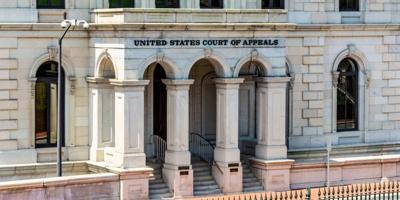
RICHMOND, Virginia – A federal appeals court has affirmed a lower court ruling to uphold West Virginia’s near-total abortion ban.
The U.S. Court of Appeals for the Fourth Circuit issued its 2-1 ruling July 15 in the appeal filed last year by GenBioPro, the nation’s only generic maker of mifepristone, claiming abortion ban is preempted by federal law and should be struck down. GenBioPro called the state’s “extremist” Unborn Child Protection Act that came in the wake of the U.S. Supreme Court’s Dobbs ruling.
“Big win out of the 4th Circuit today,” Gov. Patrick Morrisey said in a press statement. “I defended this law as Attorney General and am proud to see a victory in this case. West Virginia can continue to enforce our pro-life laws and lead the nation in our efforts to protect life. We will always be a pro-life state!”
GenBioPro said today’s ruling “jeopardizes women’s access to the FDA-approved medication.” It says the state now will be allowed to restrict access to medications that FDA has deemed safe and effective, “threatening a dangerous ripple effect on the availability of essential medications in this country” and permitting states to override FDA’s authority.
The company also notes the dissent by Judge DeAndrea Gist Benjamin, which it says laid out clearly the adverse impacts the ruling will have on West Virginians’ access to lifesaving care.
“The twin sensitivities of abortion access and states’ rights cannot influence our willingness to recognize the Food and Drug Administration’s (FDA) clear authority in this area,” Benjamin wrote.
The Fourth Circuit heard arguments in the case last October.
The West Virginia law bans abortions in almost all cases at any stage of pregnancy and makes it a felony for anyone other than physicians to sell, prescribe or dispense mifepristone outside of the act’s narrow exceptions. GenBioPro, the nation’s only generic manufacturer of mifepristone, has said only the Food and Drug Administration may regulate access to the drug.
“The court is allowing the state to continue putting those seeking medication abortion care in harm's way,” said GenBioPro CEO Evan Masingill. “The panel’s ruling allows states to restrict access to medications that FDA has deemed safe and effective, threatening a dangerous ripple effect on the availability of essential medications in this country.
“As we have always made clear, GenBioPro will not stop fighting to ensure all people can access safe, evidence-based healthcare.”
Skye Perryman, president and CEO of Democracy Forward and co-counsel on the case, agreed.
“Despite the overwhelming majority of Americans supporting the legal right to abortion, far-right politicians remain determined to severely restrict access to a critical drug that women across America depend on,” Perryman said. “West Virginia’s near-total abortion ban is unlawful and is a dubious effort by extremists to substitute political ideology for medicine and science.
“This ban harms people who seek medication abortion in West Virginia – and sets a dangerous precedent regarding access to other evidence-based health care that FDA has deemed safe and effective. Access to federally approved medication should not depend on one’s zip code but unfortunately today’s decision creates that reality for many.”
GenBioPro produces about two thirds of all mifepristone sold in the United States, and it has held FDA approval for the generic version since 2019. Medical abortion using the two-drug regimen involving mifepristone early in pregnancy – with another drug called misoprostol – is the most common and preferred form of abortion care in the United States, accounting for more than half of all pregnancy terminations.
GenBioPro’s appeal was filed with the Fourth Circuit just days after U.S. District Judge Robert C. “Chuck” Chambers had entered a final dismissal order in the case it had filed regarding its generic mifepristone abortion pill. Chambers’ order dismissed the final count in GenBioPro’s challenge to West Virginia medication abortion ban and restrictions.
The company appealed Chambers’ dismissal of its challenge that the state’s Unborn Child Protection Act is preempted because it conflicts with the U.S. Food and Drug Administration decision to approve and regulate mifepristone for medication abortion. The challenge also said this law and some state telehealth laws are unconstitutional.
Chambers said the U.S. Supreme Court’s Dobbs decision makes it clear the regulation of abortion falls on the states, and that West Virginia was regulating health care, not the company itself, in the Unborn Child Protection Act.
The West Virginia Attorney General’s office under Morrisey had won an earlier partial dismissal when Chambers ruled West Virginia’s Unborn Child Protection Act was not preempted by federal law and dismissed all other claims except the preemption attack on the telehealth provisions.
“The new Unborn Child Protection Act is not preempted by federal law and all of these statutes are constitutional – that is our position, and the judge agreed with us,” Morrisey previously told The West Virginia Record.
The FDA has relaxed restrictions on the medication. During the COVID-19 pandemic, it allowed patients to receive the pill by mail. And last year, the FDA approved retail pharmacy dispensing of the drug with a certificate.
West Virginia’s law bans most abortions. There are exceptions for rape and incest victims as well as in cases of life-threatening medical emergencies and nonviable pregnancies.
GenBioPro is being represented in the Fourth Circuit by Kellogg Hansen Todd Figel & Frederick, Democracy Forward and Arnold & Porter Kaye Scholer.
U.S. Court of Appeals for the Fourth Circuit case number 23-2194 (U.S. District Court for the Southern District of West Virginia case number 3:23-cv-00058)




